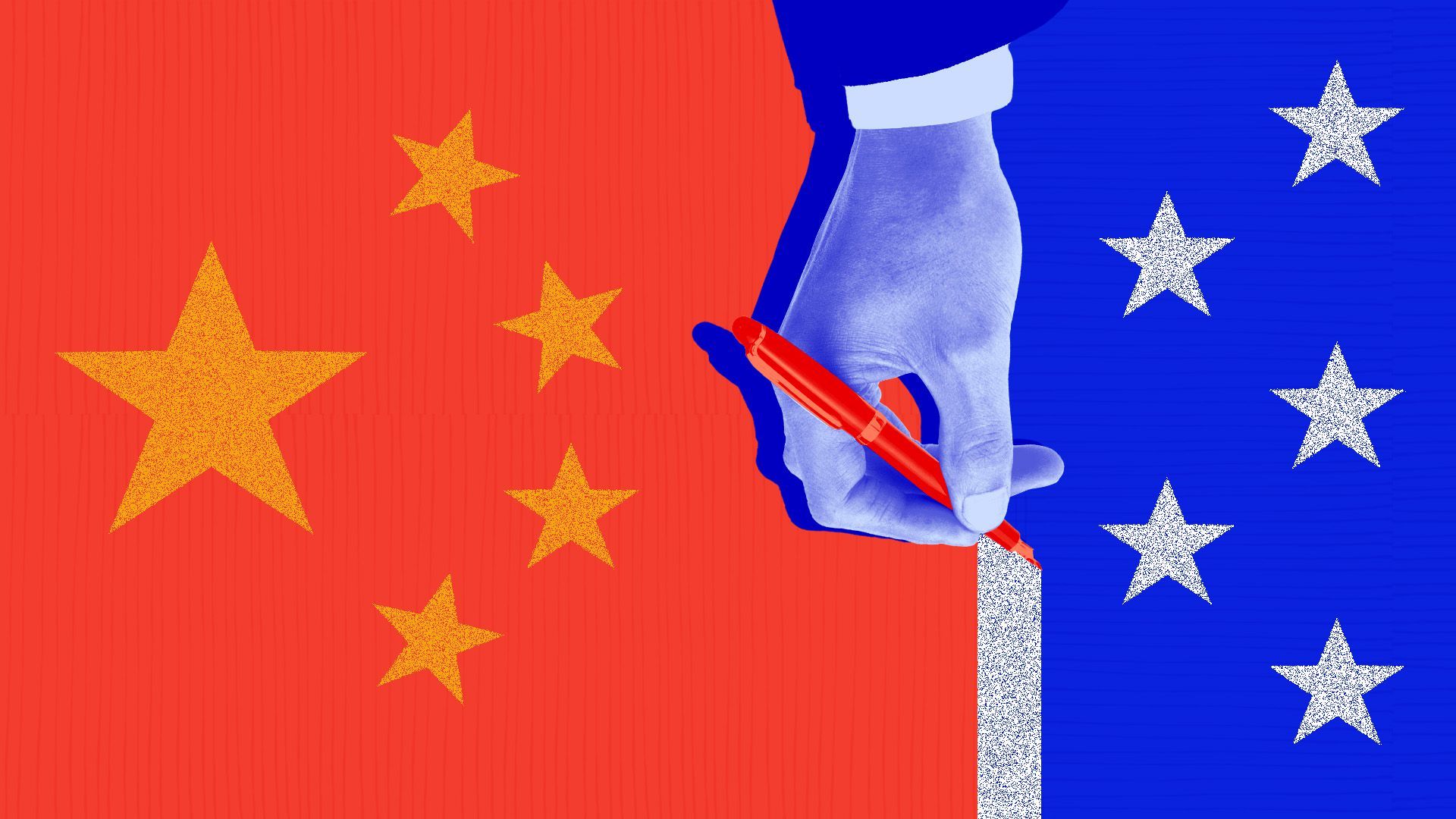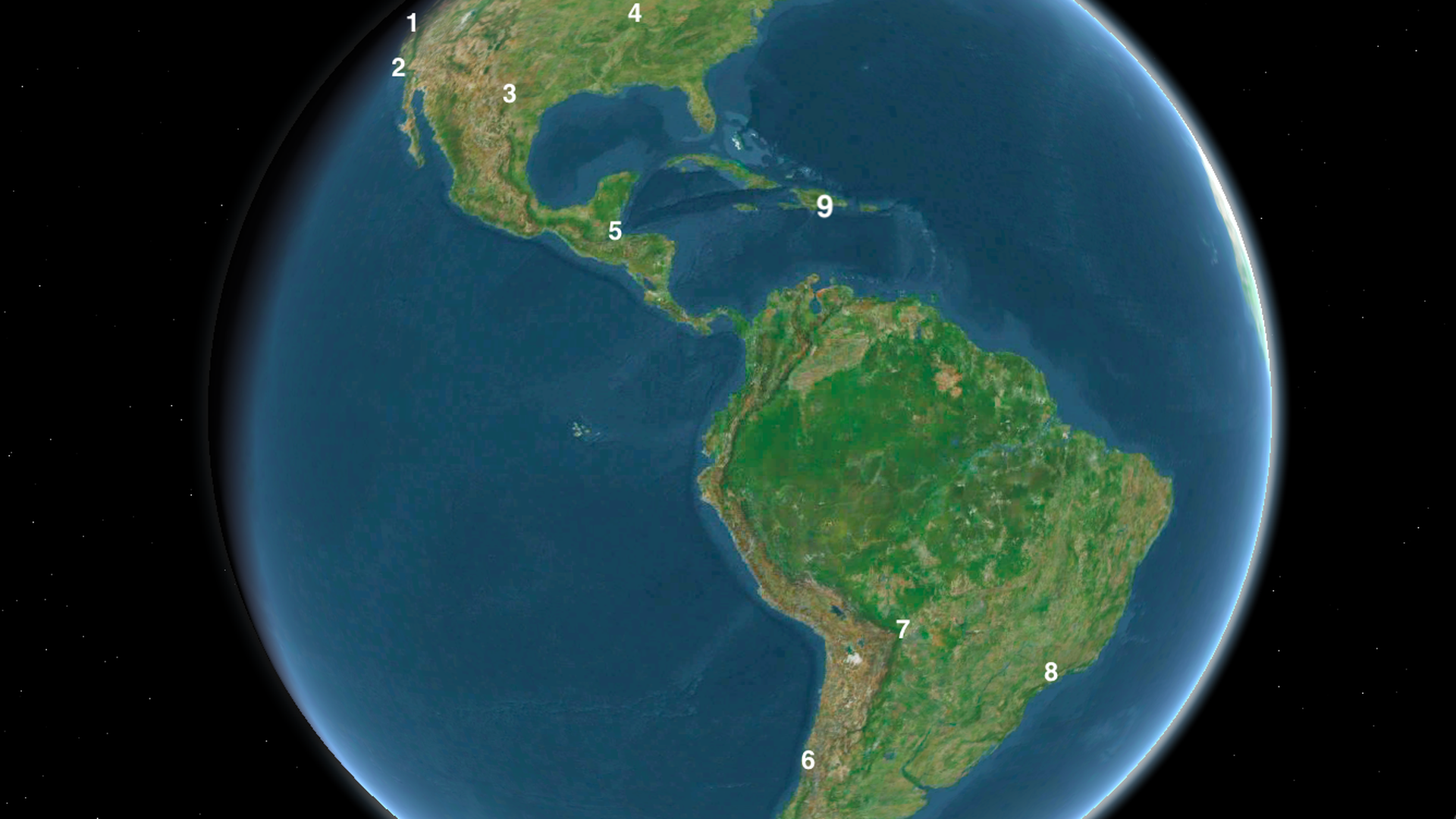| | | | | | | | | | | Axios World | | By Dave Lawler ·Feb 14, 2022 | | Welcome back to Axios World. - It's good to be back in your inbox after two weeks off the grid. While I've hit the refresh button, the global headlines haven't. So let's start tonight (1,862 words, 7 minutes) in Ukraine.
Heads-up: Join Axios' Astrid Galván and Russell Contreras tomorrow at 12:30pm ET for a virtual event spotlighting change-makers in the Afro Latino community. Register here. | | | | | | 1 big thing: U.S. moves embassy and braces for invasion |  | | | Putin today in an intimate meeting with his top diplomat, Sergey Lavrov. Photo: Kremlin Press Office/Getty Images | | | | The U.S. is relocating its embassy operations from Kyiv to Lviv in western Ukraine due to fears of a Russian invasion that U.S. officials believe could begin within the next 48 hours. The other side: That announcement contrasted sharply with the scenes in Moscow today as top Russian officials briefed Vladimir Putin in carefully choreographed meetings that diplomacy will continue and military exercises near the border will wind down. - Foreign Minister Sergey Lavrov told Putin that Moscow's Western interlocutors had shown a "willingness to enter into serious negotiations" and "a way forward" could still be found, though talks must not continue indefinitely without results.
- Defense Minister Sergei Shoigu, who like Lavrov briefed Putin from the far end of an enormous table, said some military exercises had concluded while others would soon wrap up.
- However, experts tracking Russia's military movements report that more military units have continued to arrive near the border. State Department spokesperson Ned Price said the U.S. had yet to see "anything resembling de-escalation."
The big picture: Russia appears to now have all the pieces in place to conduct a full-scale invasion. - The question remains whether that buildup is engineered primarily to intimidate or topple the government in Kyiv, or to force the U.S. and its allies to seriously reckon with Russia's security demands in Europe.
State of play: In addition to the embassy move, the U.S. is urging all Americans still in Kyiv to get out. U.S. officials continue to insist an invasion could begin at any time and have reportedly pinpointed Wednesday as the possible launch date. - The Biden administration has been so forward-leaning in issuing warnings in part out of a hope that calling out Putin's plays ahead of time will deny him a pretext for invasion.
- Yes, but: They've acknowledged that they don't know whether Putin has made a final decision.
European leaders are searching for a diplomatic off-ramp that has remained elusive up to now. - German Chancellor Olaf Scholz is visiting Kyiv today and Moscow tomorrow, following French President Emmanuel Macron's trips last week. Scholz's aides say he's seeking to better understand Putin's intentions but doesn't expect a breakthrough.
- Between the lines: Some in Washington are suspicious of Macron's diplomatic ambitions and Scholz's relative dovishness on sanctions and arming Ukraine, but they may be better positioned than Biden to find a diplomatic formula that allows Putin to save face while pulling back from the brink.
Russian officials continue to accuse the U.S. of fear-mongering and deny any intention to invade. - Lavrov lamented Saturday, following a call with Secretary of State Tony Blinken, that if Russia pulls its troops back (as he claims was always the intention), it will be heralded in the West as a "diplomatic victory."
- Putin's timeline remains uncertain. Michael Kofman of CNA expects a "go/no go decision this week," while Richard Haass of the Council on Foreign Relations contends Putin could plausibly extend the crisis indefinitely by leaving troops near the border.
Ukrainian President Volodymyr Zelensky continues to caution that panic only plays into Putin's hands. - He said today that his family will remain with him in the capital, that Western diplomats should stay in Kyiv, and that oligarchs who fled the country should return.
What to watch: Finance ministers from the G7 countries vowed today that Russia will face "massive and immediate" economic consequences if it invades. - But for now, it's Ukraine's economy that's getting hit hardest by the threat of war, and several major airlines are avoiding Ukrainian airspace.
- While the streets of Kyiv appear calm, residents are making contingency plans to flee or fight, FP's Amy Mackinnon reports.
|     | | | | | | 2. New U.S. intel on Ukraine led Israel to evacuate citizens |  | | | Passengers arrive in Tel Aviv from Kyiv. Photo: Jack Guez/AFP via Getty | | | | Israel's decision to call for its nationals to leave Ukraine immediately was based on an updated intelligence report shared by the U.S. on Friday evening, five Israeli officials with direct knowledge of the issue tell Axios' Barak Ravid. Why it matters: Israel has strong relationships with both Russia and Ukraine and for weeks avoided taking steps that could upset either partner, but the report — which warned of a likely Russian invasion this week — changed the equation. Behind the scenes: Last Friday morning, officials at the Israeli Foreign Ministry debated whether to call on the 10,000–15,000 Israeli nationals in Ukraine to evacuate. - The decision published Friday afternoon was that the families of Israeli diplomats in Ukraine should evacuate and Israeli citizens should consider leaving.
- That night, the U.S. sent Israel and several other key allies, mainly in NATO, the updated intelligence report.
Prime Minister Naftali Bennett convened a high-level consultation about the situation on Saturday at noon. - The fact that Bennett, an observant Jew, did this during Shabbat underscored the sense of urgency.
- The Israeli officials say it was unclear how much of the assessment was based on hard intelligence and how much on analysis of the events on the ground — or influenced by lingering trauma from the botched U.S. Afghanistan exit.
- But it was urgent enough that the government quickly agreed to call on all Israelis to evacuate.
The latest: Israel had deployed several diplomats to Kyiv to help with the evacuation process, and more than 1,000 Israelis left Ukraine on Sunday alone. Go deeper. |     | | | | | | 3. Cold war watch |  | | | Illustration: Sarah Grillo/Axios | | | | 1. Assistant Secretary of State for African Affairs Molly Phee arrived today in Equatorial Guinea, a tiny West African state that's usually a long way from Washington's radar. - Why it matters: The visit is part of an attempt to convince the ruling family not to allow China to build a military facility on its Atlantic coast by offering "counter-piracy assistance and other inducements," WSJ reports.
2. Blinken announced on Saturday that the U.S. would open an embassy in the Solomon Islands, a South Pacific archipelago with less than 1 million inhabitants. - Context: The move comes two months after protesters attempted to storm parliament in an attempt to depose the prime minister, apparently in part over his decision to rescind diplomatic recognition of Taiwan in favor of China in 2019.
3. The U.S. believes Chinese opposition has led Nepal to delay ratification of a $500 million U.S. grant project, a State Department spokesperson told the Hindustan Times. The original five-year window to ratify the 2017 deal, which aims to increase Nepal's electricity supply and lower transportation costs for trade with India, is up at the end of the month. - The big picture: Nepal has become a focal point of geopolitical competition between its giant neighbors, India and China, as well as the U.S. Go deeper.
4. Sens. Bob Menendez (D-N.J.) and Marco Rubio (R-Fla.) introduced a bill last week to counter Chinese and Russian "meddling" in Latin America, including through security cooperation with countries in the region. - Driving the news: Per the Economist, "The presidents of Argentina and Ecuador have traveled to Beijing to strike economic deals with China; Argentina has now joined the Belt and Road Initiative," and China recently backed Argentina's claim to the Falkland Islands.
Go deeper: The Biden administration on Friday released its official Indo-Pacific strategy, which warns that there is only a narrow window of time remaining to prevent China from transforming the region into its own sphere of influence, Axios' Bethany Allen-Ebrahimian and Zach Basu report. |     | | | | | | A message from Axios | | The podcast to power your day. | | |  | | | | Every weekday, host Niala Boodhoo catches you up quick on the latest news and interesting stories you won't hear anywhere else. In 10 minutes, you'll hear the latest in US and world news. Listen now for free. | | | | | | Bonus: Where in the world? |  | | | Screenshot via Apple Maps | | | | Today we're touring nine cities with saintly names, even if they're not (as with No. 5) named for actual saints. For example, if I could have fit Russia on this map, I would have included St. Petersburg. Can you name them all? Scroll to the bottom for the answers. |     | | | | | | 4. Biden's plan to split Afghan assets sparks backlash |  | | | A child sits outside in the cold in Kabul on Dec. 27, 2021. Photo: Mohd Rasfan/AFP via Getty Images | | | | President Biden's executive order to divide $7 billion in frozen Afghan assets between humanitarian relief for the people of Afghanistan and the families of 9/11 victims has come under sharp scrutiny from Afghan leaders and aid groups. Why it matters: Biden has faced significant pressure to release the U.S.-held assets, which belong to Afghanistan's central bank and were frozen after the Taliban's takeover in August. - Afghanistan is facing an extreme humanitarian crisis, with more than 23 million people suffering from acute hunger.
- The families of 9/11 victims have sued the Taliban and are seeking access to the funds in federal court. Unfreezing the funds outright would also lead to accusations that Biden is handing a massive windfall to the Taliban.
- But the UN says the freeze has contributed to a cash crunch that's exacerbating Afghanistan's humanitarian disaster.
- Former Afghan President Hamid Karzai on Sunday called Biden's plan to split the funds 50/50 "an atrocity against Afghan people." Rory Stewart, an Afghanistan expert and former British member of Parliament, said Biden was "proposing to steal Afghanistan's own money which could have been used to feed the starving."
The Biden administration argues that its hands are tied by the ongoing legal case and says it won't be able to move the $3.5 billion in humanitarian aid for at least several months. - "I think we are acting responsibly to ensure that a portion of that money can be used to benefit the people of the country where this money was given," a senior U.S. official told reporters.
Go deeper: Zach has the details. |     | | | | | | 5. Global content arms race descends on India |  Data: Parrot Analytics; Chart: Thomas Oide/Axios Facing saturation in the U.S., media giants are looking abroad for growth, and India — the second-largest internet population globally — is ripe for disruption, Axios' Sara Fischer reports. By the numbers: Global demand for Hindi-language programming is the highest by far among non-English content, according to data from Parrot Analytics. Driving the news: Disney revealed for the first time a geographic breakdown of Disney+ subscribers, and India — not North America — is currently its biggest market. - That's in part because Disney owns Hotstar, a streaming platform that's especially popular thanks to its exclusive Indian Premier League cricket rights, which expire this year. Entertainment giants are already preparing competitive bids, per WSJ.
Why it matters: When it comes to monetizing attention, "India has immense room to grow," said Ravi Agrawal, editor-in-chief of Foreign Policy and author of "India Connected: How the Smartphone Is Transforming the World's Largest Democracy." - "On eyeballs, the room to grow is now limited by the speed of the spread of the internet and TV," he said. "The real battle is over monetizing those eyeballs, whether through subscriptions, data, or advertising."
- The audience in India tends to demand localized content, which can make investments there expensive. It's also hard to drive big profits from Indian consumers who are accustomed to cheap cable and free streaming content on mobile.
Go deeper. |     | | | | | | 6. Data du jour: Global democracy declines |  Data: Economist Intelligence Unit; Map: Jared Whalen/Axios The Economist Intelligence Unit's annual index of global democracy recorded the largest aggregate decline since 2010, Zach reports. By the numbers: Just 46% of the global population lives in a democracy of some sort, per the report. Norway, New Zealand and Finland top the list, with North Korea, Myanmar and Taliban-controlled Afghanistan at the bottom. View the interactive map. |     | | | | | | 7. Stories we're watching |  | | | A big wave hits Havana. Photo: Yamil Lage/AFP via Getty | | | - "Freedom convoys": Tear gas in Paris; U.S.-Canada crossing reopens; Populism's new inferno
- Olympics: Russian skater can compete; Ukraine athlete's "no war" sign; press intimidation; medal count
- South Korean diplomat assaulted in NYC
- Iran deal debate heats up
- U.S. suspends some avocado imports from Mexico
- Hong Kong "overwhelmed" by COVID surge
- Koalas now endangered in parts of Australia
Quoted: "I'm rejecting them." — Biden on the findings of an Army report that concluded his administration didn't adequately prepare for the fall of Kabul. |     | | | | | | A message from Axios | | The podcast to power your day. | | |  | | | | Every weekday, host Niala Boodhoo catches you up quick on the latest news and interesting stories you won't hear anywhere else. In 10 minutes, you'll hear the latest in US and world news. Listen now for free. | | | | Answers: 1. San Francisco (I'd also take San Jose); 2. San Diego; 3. San Antonio; 4. St. Louis; 5. San Pedro Sula, Honduras; 6. Santiago, Chile; 7. Santa Cruz de la Sierra, Bolivia; 8. São Paulo, Brazil; 9. Santo Domingo, Dominican Republic. |  | Bring the strength of Smart Brevity® to your team — more effective communications, powered by Axios HQ. | | | | | | Axios thanks our partners for supporting our newsletters. If you're interested in advertising, learn more here.
Sponsorship has no influence on editorial content. Axios, 3100 Clarendon Blvd, Suite 1300, Arlington VA 22201 | | | You received this email because you signed up for newsletters from Axios.
Change your preferences or unsubscribe here. | | | Was this email forwarded to you?
Sign up now to get Axios in your inbox. | | | | Follow Axios on social media:    | | | | | |
No comments:
Post a Comment